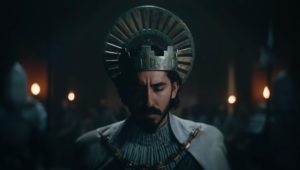Demonic Is Trippy Sci-Fi Fun, and That’s About It
It's good for your film viewing needs, but isn’t going to shake your world. Demonic is trippy sci-fi fun, and that’s about it. And that's pretty cool.
Incluvie Foundation Gala - Learn More


High fantasy, especially that of the medieval persuasions, is a subgenre we don’t see much of, but when we do, we flock to the cinema. There’s just something so inciting about their blend of the ethereal and the rustic. In a sense, it creates a nostalgia for an era of storytelling before any of us.
So, I was more than elated when the announcement of The Green Knight came from A24. Not only because it promised the usual beauty you get with their pictures, but also a gritty and contemporary twist on chivalric romance? I mean yes, 1000 times yes! While rolling in my excitement, I also noticed the choices made with the cast. There seemed to be some purposeful choice to have POC actors. I mean Gawain himself is played by the awesome Dev Patel. But the realms and spaces brown people occupy are… kind of questionable. It isn’t a blink and you’d miss its scenario, but follows points on a checklist I’ll dive into later. And personally, it opened a dialect about whether medieval fantasy has space for multi-ethnic portrayals. Would that lean into cultural appropriation? And even if it did, is that a bad thing? Check out the detailed “The Green Knight” review with cultural appropriation.

Medieval fantasy has historically never been a safe space for POCs. Whether it’s for adults, like Hard to Be a God, or for children like Snow White, more often than not, the most luck we have in seeing ourselves is a side character who will surely be dead or evil. Although I’m just as frustrated as other BIPOC fans of the genre, in this particular case I can at least see the cogs that led us here. Medieval stands out from other fantasy subgenres in how based in history it is. Sure, something like Legend may have a nod here and there, but a film like The Hunchback of Notre Dame grounds itself by having real places, people, imagery, and cultural touch stones. They are pulling from European cultures during a very white time. So in theory, giving the role to a brown person would be unfair right?
In having the conversation about cultural appropriation and who plays who on screen, I think it is imperative to acknowledge how easy and almost harmless it can feel. As creatives, we are drawn to vibes more than logic. So, sometimes you’ll experience someone’s audition, and, without thinking about it, just feel they are perfect for the role. For me, the decider of when it’s harmful or harmless is dependent on the audience. Here’s an example: If Robin Hood were played by a Pakistani woman, then there would be no risk of his 14th-century English roots being forgotten because most of us took a 6th grade history course. But if the shoes were flipped, and an adaption of the Painted Jackal had white men in the leading role, that could run the risk of people assuming the story has a white heritage. Having brown people on set of your LARP session for the big screen isn’t going to hurt anyone’s understanding of the Middle Ages; We’d all be able to digest it for the historical fiction that it is. As I said earlier, I believe The Green Knight kind of gets that, at least a little.

I mentioned this picture stole a few points from a checklist, but which ones exactly? Firstly, a lot of the black and brown cast members are played by characters placed for immersion. While doing research, I was surprised to see a lot of faces belonging to POC because I was definitely looking for them during the film and did not see a single one. That’s because they were playing giants and soldiers — people in the film who had the heaviest make up and VFX obscuring them. Next, there were a few ambiguous hires. Erin Kellyman and Alica Vikander are in the film, but due to choices made in the editing room, they both looked incredibly washed. If I was not familiar with Erin, I would assume she is white. The only POCs that we can easily see are Dev Patel and those who are related to him in the movie.

But the above is not a detriment to anyone involved; I found the film to be very well acted. Erin and Alica gave the perfect amount of chill and intrigue in their lines. The same can be said for Patel himself. Patel perfectly carries the film’s progression to an emotional throughline. He gives the right amount of naïve innocence and aged sorrow exactly when he needed to. Also, I really enjoyed the white actors. Sean Harris and Katie Dickie do a great job of playing weirdly distant parental figures. And Joel Edgerton is giving what Joel Edgerton always gives. All of the cast does a really good job of moving the story from beat to beat.
None of them did anything wrong, and yet the ratio of white to brown actors is so large that it’s hard to ignore. But it didn’t have to be. We as a people are so removed from the origins of 13th-century art. We’re pointed toward the future, and part of that should be updating aspects of our stories to mirror those evolutions. This film is breathtaking, full of intricate long shots with so much world-building and story. And I truly believe we have reached a time in cinema where we all should see ourselves in that beauty. I mean it’s 2021; Why is The Green Knight so white?
Related lists created by the same author
It's good for your film viewing needs, but isn’t going to shake your world. Demonic is trippy sci-fi fun, and that’s about it. And that's pretty cool.
Related diversity category
'Run This Town' takes an unflinching look at the Rob Ford scandal that shook Toronto to its core while using fictional millennials to drive a concise story .
Related movie/TV/List/Topic
This Nickelodeon live-action TV series features strong Black representation.